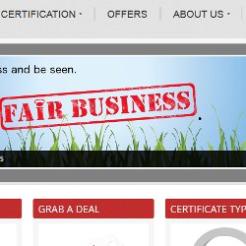A think tank has launched a new social enterprise kitemark to rival the Social Enterprise Mark, arguing that competition is a good thing for the sector.
The Fairbusiness mark was launched by Smarter World, a human development think tank, last week and offers two types of certification – UK Fairbusiness and Global Fairbusiness.
Founder Milan Pastor said: “Fairbusiness brings much needed competition to the UK's social enterprise certification, which will hopefully bring better services and prices for all.”
He told civilsociety.co.uk that he had initially planned to set up his own social enterprise but found that the public and investors did not know social enterprise meant.
Pastor said he had decided against signing up to the Social Enterprise Mark because: “I wasn’t particularly convinced about the value of the Social Enterprise Mark – only 450 social enterprises out of an estimated 70,000 to 80,000 social enterprises in the UK.”
Social Enterprise Mark launched in 2010 and charges between £350 (plus VAT) and £4,500 (plus VAT) for a year’s membership, although there are discounts for organisations that are members of Social Enterprise UK and other umbrella bodies.
The Fairbusiness kite mark is free for organisations with annual turnover less than £10,000, then £60 for companies with between £10,001 and £50,000 rising incrementally to £4,500 for organisations with an income of £50m plus.
Fairbusiness criteria for UK certification include:
- compliant with UK legislation and community standards
- make at least 50 per cent of its income from trading and/or manufacturing
- state in its governing documents that at least 50 per cent of any profit made will be used to pursue social and/or environmental objectives
- have a social and/or environmental mission and policy in place
- be independent
- not rely on volunteers
- account for social and environmental costs it creates
Criticism
David Floyd, who runs Social Enterprise Spider, described the news as “bizarre” in a blog.
He added that a kitemark was not necessarily the best way to prove an organisation’s social credentials: “Membership of Social Enterprise UK is one obvious substitute for buying the Social Enterprise Mark but others which potentially work just as well are registering as a community interest company or, in the vast majority of situations, just telling people that you’re a social enterprise and explaining what it is you do.”
A spokeswoman for Social Enterprise Mark said: "We are very clear about what we stand for, and that we have a mandate from the social enterprise sector. Applications are overseen by an independent panel - that is where our credibility comes from"
Social Enterprise Mark told civilsociety.co.uk that its number of members fluctuates on an annual basis and that at the moment it has around 350 members. The online biography of Lucy Findlay, managing director at Social Entperise Mark, states that there are "more than 460 mark holders".










